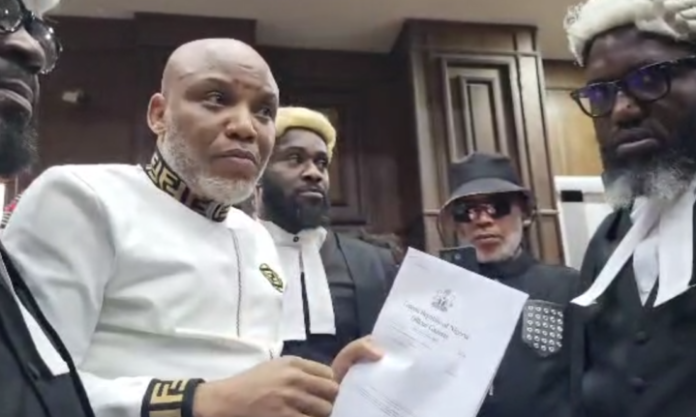The Federal Government has begun presenting its case against Nnamdi Kanu, leader of the Indigenous People of Biafra (IPOB), by calling its first witness at the Federal High Court in Abuja. The prosecution opened by describing how Kanu was arrested in 2015 at a Lagos hotel with a young woman and radio equipment linked to illegal broadcasts.
The first witness, identified only as AAA for security reasons, testified from behind a screen. He is an officer with 18 years of service in the Department of State Services (DSS). According to his account, Kanu was arrested on October 14, 2015, at the Golden Tulip Hotel near Lagos International Airport.
AAA said DSS agents could not find Kanu’s name on the hotel’s guest list, so they conducted a room-by-room search. He was eventually discovered in Room 303 with a woman named Maria Ibezimakor. The witness said Kanu resisted arrest and even headbutted an officer. Inside the room, agents found radio equipment allegedly used to run Radio Biafra.
The equipment was confiscated and taken to the DSS office in Lagos. There, Kanu reportedly signed a document confirming the equipment was his. The next day, he was interrogated. The video of that interrogation was played in court and admitted as evidence.
In the footage, Kanu admitted to founding and operating Radio Biafra without a broadcast licence from Nigerian authorities. He acknowledged it was illegal but claimed his application for a licence would never have been approved. He described himself as a freedom fighter for the South-East, South-South, and Middle Belt regions. He also referred to the United Nations Charter as the basis for his stance on self-determination and denied being involved in any violent activities.
Kanu, a trained communication engineer, said Radio Biafra’s staff operated from countries including the United States, Russia, Italy, and Sweden. He noted that while the station had no office in Nigeria, local supporters willingly distributed its content.
During the session, the court rejected a request from the defence team, led by Senior Advocate of Nigeria Kanu Agabi, to allow 22 lawyers. Justice James Omotosho upheld the existing limit of 13. Other lawyers on the team include Audu Nunghe, Joseph Akubo, Emeka Etiaba, and Onyechi Ikpeazu.

